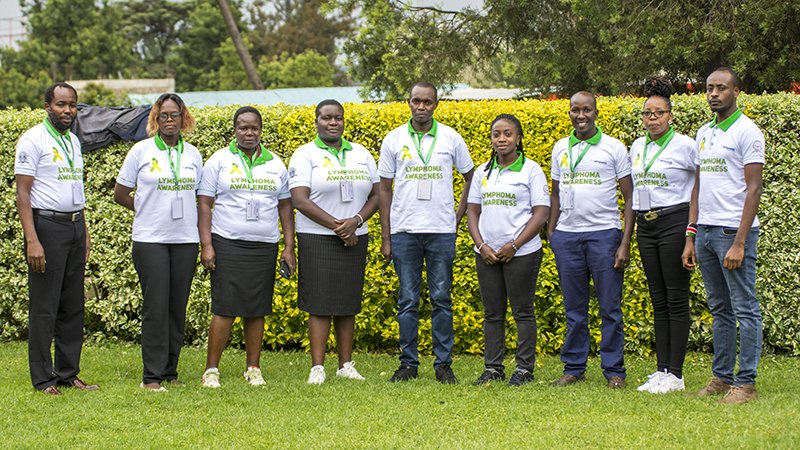Walking Together, Walking Far: AMPATH's Life-Changing Impact on Burkitt Lymphoma Care
Reagan* complained of abdominal pain with some rapidly progressing swelling and difficulty in passing stool. His mother Clare* thought they would get help for her son at Moi Teaching and Referral Hospital (MTRH). The 650 km (400 miles) journey from their home to Eldoret took more than 15 hours using public transport.
Reagan was scheduled for laparotomy surgery to relieve the obstruction and draw tissue samples. Three weeks later, the tests confirmed he had Burkitt lymphoma. As anticipated, Clare received the cancer diagnosis with anxiety, fear and uncertainty. The news was understandably paralyzing for her. In addition to the emotional turmoil, the glaring financial implications for Reagan to receive treatment scared her.
AMPATH BLP team
“Burkitt lymphoma is an aggressive cancer and Reagan did not have the luxury of time. Unlike many of the patients that we enroll at more progressive stages, the malignancy for Reagan was at stage two (the lower end of four stages),” said Lorna Akinyi, research nurse for the AMPATH’s Burkitt and Lymphoma Program (BLP). “However, like most patients, Reagan did not have National Health Insurance Fund (NHIF), and his family could not afford his treatment or transport to the hospital. That did not deter Reagan's treatment, as the program facilitated the chemotherapy sessions and enrolled him in NHIF. Thanks to the financial, psychosocial, and medical support, we are happy to say that Reagan is now in complete remission," she shared.
As the program staff gave the heartwarming report to Clare that her son was in the clear, they were also in a somber discussion with Anne* from a county north of Eldoret, explaining to her the long-term life-changing implications of her earlier treatment.
Anne was also diagnosed with Burkitt lymphoma when she was a child and had presented with an abdominal mass. Anne had a surgery called a bilateral oophorectomy to remove her affected ovaries. Anne recovered and had a normal and healthy childhood.
"Anne's mother could barely communicate in either English or Swahili when they came to seek treatment, and the language barrier was just one of their challenges,” recalled Lorna. “Their family also had no insurance or money to attend the regular clinics. Like many cases presented to us, we supported Anne’s treatment. Now that she is becoming an adolescent, the team has to help her understand what it means to be an adolescent after the removal of her ovaries. The longer-term implication is that she will not be able to have children naturally. Still, as an adolescent, the ovaries are a big part of hormonal changes she would otherwise expect," Lorna continued. She affirmed that the BLP is not only concerned with the patient's immediate treatment but is determined to walk the wellness journey with them and their families.
Anne and Reagan are two of the many children the AMPATH BLP has walked with through diagnosis, treatment and beyond. The program was established in 2017 with the support of Takeda Pharmaceuticals. It aims to increase the accessibility of Burkitt lymphoma care and treatment services in the western Kenya regional belt through sustained collaborative efforts among the multidisciplinary departments at AMPATH/MTRH, as well as the county referral hospitals.
"Burkitt lymphoma is a rapidly growing cancer of the lymphatic system, primarily affecting children and young adults,” explains Dr. Gilbert Olbara, a pediatric haematologist and oncologist at MTRH and the Burkitt and Lymphoma Program principal investigator. “Some common symptoms include swollen lymph nodes, jaw mass, mass in the abdomen, intestinal obstruction, pain in the abdomen, fatigue, fever, night sweats, weight loss, loss of appetite, bone pain, and numbness or tingling. Burkitt lymphoma is serious cancer, but it is often treatable, especially if it is caught early," In 2022, the program screened more than 1,000 people.
Bridging the Gap:
The BLP focuses on clinical care, patient support, training and research. It addresses limited care, poor infrastructure, and challenges in the referral system.
The program provides financial support through the treatment continuum offering diagnostic support to lymphoma patients. BLP also offers transport support to both suspected and confirmed cases as they seek care due to the vast geographical catchment area of the patient. Most patients present to the facility without NHIF, and the program pays for their premiums for one year upfront.
After cancer diagnosis, and without an adequate guide to the right interventions, some patients resort to alternative therapies (herbal and spiritual remedies), only to return after disease progression. The program has been beneficial in offering psychological support for patients and caregivers/parents. Last year, the program provided psychosocial support to more than 130 people. It holds survivorship meetings for lymphoma patients and their caregivers. The program also employs patient navigators to assist with cancer treatment, transitional care, and improving access to care.
Raising Awareness
Training and awareness efforts include radio talk shows, information dissemination through outreach events, and community health promoters (CHPs) education. Continuous medical education seminars are conducted for healthcare professionals to raise awareness and improve early detection. The program utilizes Project ECHO, a telementoring program, to enhance knowledge sharing and increase access to best practice treatment for underserved communities. More than 800 community health workers have been educated about Burkitt Lymphoma and 750 healthcare workers in county hospitals trained by the program thus far. Research studies, such as Burkitt's Enhanced Survival and Treatment (BEST), focus on improving treatment outcomes and raising awareness.
*Names have been changed to preserve patient privacy


